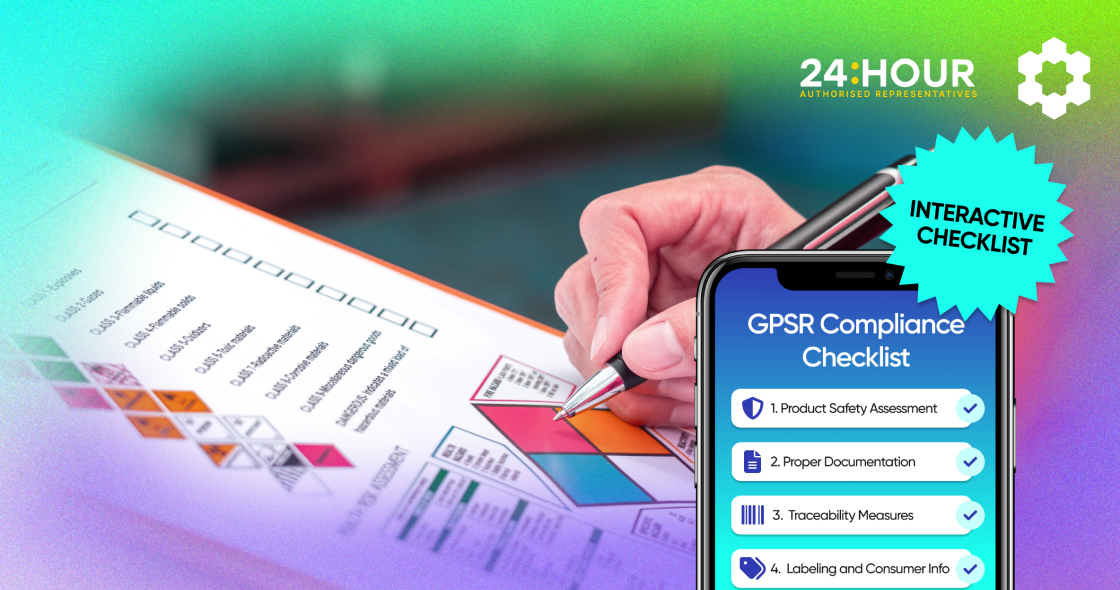The General Product Safety Regulation (GPSR) is a critical framework for ensuring consumer product safety in the European Union (EU). If you sell products in the EU, compliance with GPSR is not optional—it is a legal requirement. Non-compliance can result in hefty fines, product recalls, and reputational damage.
In this guide, we’ll provide a step-by-step GPSR Checklist, break down the GPSR requirements, and outline strategies to mitigate risks associated with non-compliance.
GPSR Compliance Checklist
1. Conduct a Product Safety Assessment
2. Ensure Proper Documentation
3. Implement Traceability Measures
4. Labeling and Consumer Information
5. Establish a Market Surveillance and Recall Plan
6. Cooperate with Market Authorities
An Overview of GPSR Compliance
GPSR is designed to ensure that all consumer products sold in the EU meet strict safety standards. The regulation applies to manufacturers, importers, and distributors, including ecommerce businesses, requiring them to take proactive measures to prevent unsafe products from reaching consumers.
Key elements of GPSR compliance include:
- Product safety assessments.
- Traceability requirements.
- Documentation and record-keeping.
- Having an EU-based economic operator, such as an authorized representative (AR) or importer.
- Consumer communication and recalls.
- Market surveillance cooperation.
Failure to comply with GPSR can result in severe penalties, including fines, product recalls, and legal consequences. By adhering to these regulations, businesses not only protect consumers but also enhance their reputation, build trust, and ensure smooth market access within the EU.
Who Needs to Comply?
Businesses involved in the production, import, and distribution of consumer products in the EU must adhere to GPSR guidelines. This includes:
- Manufacturers who produce goods within the EU.
- Manufacturers from outside the EU selling products into the EU.
- Importers who bring goods from non-EU countries.
- Distributors who sell products within the EU.
Failure to comply can result in serious legal and financial consequences.
Mitigating GPSR Compliance Risks
GPSR non-compliance can lead to legal consequences and business disruptions. Here are strategies to mitigate risks effectively:
1. Conduct Regular Compliance Audits
Regular internal audits ensure that your products continuously meet safety standards. This includes:
- Periodic testing and risk assessments.
- Reviewing documentation and labeling accuracy.
- Ensuring suppliers follow GPSR requirements.
By conducting regular audits, businesses can proactively identify and address potential compliance issues before they become major risks. This not only helps maintain product safety and regulatory adherence but also fosters consumer confidence and strengthens brand integrity in the marketplace.
2. Stay Updated on Regulatory Changes
Regulations evolve, and staying informed is essential.
- Subscribe to EU regulatory updates.
- Engage with industry associations and compliance experts.
- Train employees on the latest compliance requirements.
Staying ahead of regulatory changes helps businesses adapt quickly, avoid compliance risks, and maintain a strong market presence. Keeping teams well-informed ensures smooth operations and continued consumer trust.
3. Partner with Certified Testing Labs
Ensure that all products undergo rigorous safety testing by accredited laboratories. Certification from recognized bodies provides assurance of compliance and reduces the risk of regulatory action.
4. Implement Robust Quality Control Measures
A strong commitment to quality control ensures product safety and reliability. Implementing rigorous inspection processes at every stage of manufacturing helps catch potential issues early, preventing defective products from reaching consumers. A proactive approach to quality control enhances product reliability, maintains customer trust, and strengthens brand reputation. Here are some steps to take to maintain quality control:
- Inspect products during manufacturing and before shipment.
- Work with reliable suppliers who adhere to safety standards.
- Address potential defects before products reach consumers.
Prioritizing robust quality control measures minimizes risks, reduces costly recalls, and ensures customer satisfaction. Partnering with reliable suppliers, conducting thorough inspections, and addressing defects promptly create a foundation for delivering safe and high-quality products. A strong quality control system safeguards both consumers and the company’s reputation.
5. Leverage Compliance Software
Using compliance management software can streamline documentation, traceability, and audit processes, reducing manual errors and ensuring regulatory alignment.
Common Questions About GPSR Compliance
The above checklist will help businesses stay compliant with GPST, but here are some common questions about GPSR compliance.
1. How is GPSR enforced?
GPSR is enforced by national market surveillance authorities within EU member states. These authorities have the power to inspect products, issue recalls, and impose penalties on businesses that fail to comply.
2. What are the consequences of non-compliance?
Failure to comply with GPSR can lead to product recalls, fines, legal action, and damage to a company’s reputation. Authorities can remove unsafe products from the market and hold businesses accountable for any harm caused.
3. Can a product still be sold if it doesn’t fully meet GPSR?
Under the General Product Safety Regulation (GPSR), products placed on the EU market must meet general safety requirements. If a product does not meet GPSR requirements, it is generally not allowed to be sold, regardless of the level of risk.
However, if a product poses a minimal risk but is still deemed safe for consumers, market surveillance authorities may allow it to remain on the market under certain conditions, such as corrective actions, additional warnings, or safety instructions.
4. How long must businesses maintain records for GPSR compliance?
Businesses are required to keep records of product safety assessments, risk management actions, and any complaints related to their products for a minimum of 10 years. These records must be available for inspection by regulatory authorities.
5. Does GPSR apply to online sales?
Yes, GPSR applies to both physical stores and online sales within the EU. Businesses selling products online must ensure their goods comply with the same safety standards as those sold in brick-and-mortar shops.
6. Are there penalties for false claims of compliance?
Yes, making false claims about product safety or compliance with GPSR is considered a serious violation. Penalties can include fines, product recalls, and legal actions. It is essential for businesses to be transparent and accurate about their compliance efforts.
Ensuring GPSR Compliance
GPSR compliance is essential for ensuring product safety and avoiding legal consequences in the EU market. By following the GPSR checklist and implementing risk mitigation strategies, businesses can safeguard their operations and protect consumers.
Consider leveraging EU and UK AR Services to simplify the process, maintain documentation, and stay ahead of regulatory changes.







